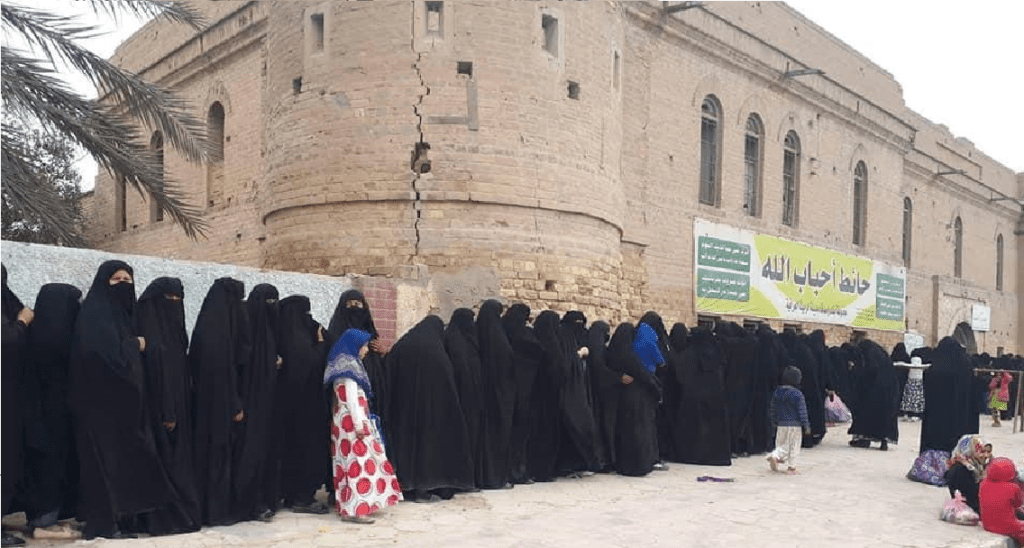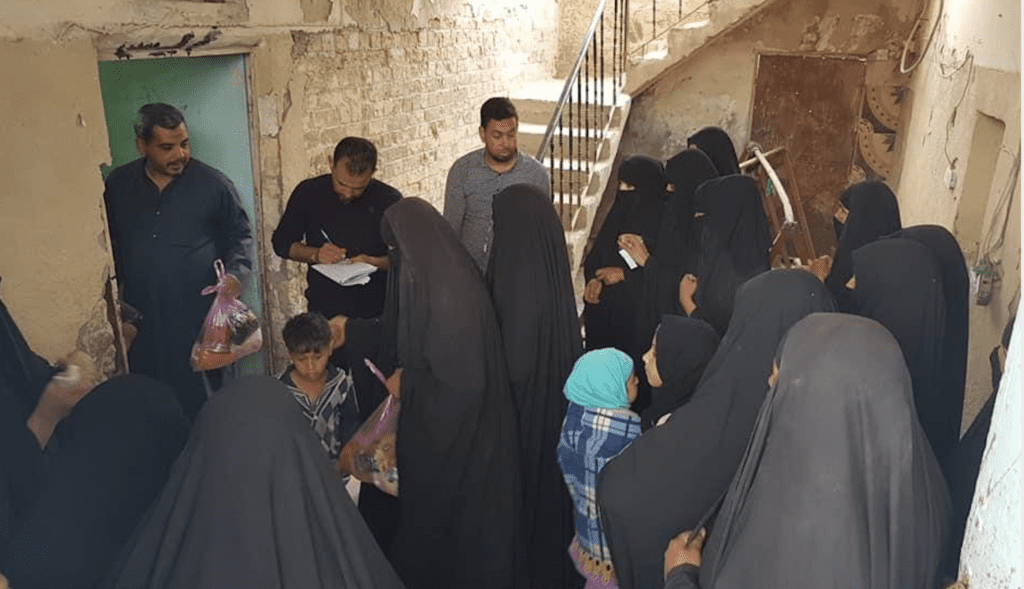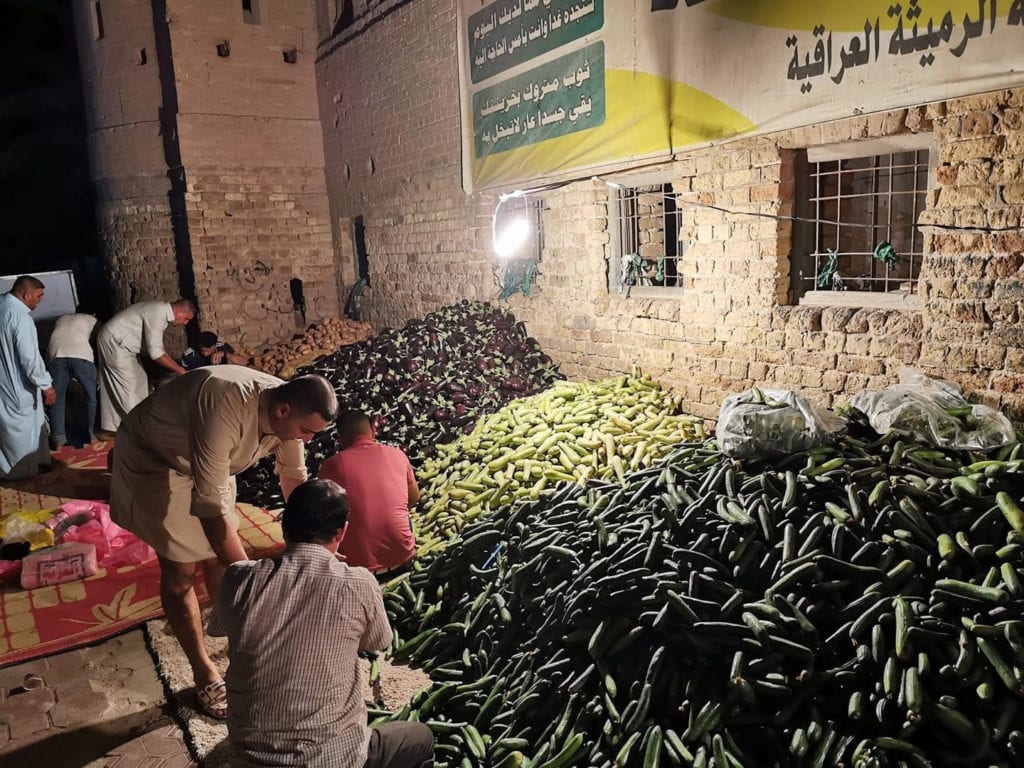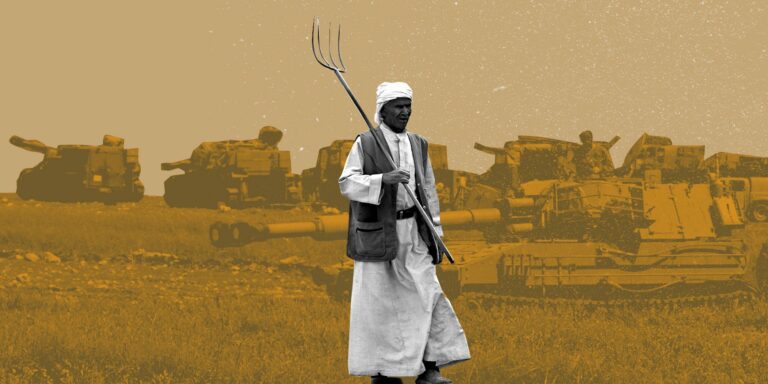Her muddy face seemed to be drowning in the darkness of a room lit by an oil lamp, as she looked over at her sleeping children, while repeating her prayers, before she got up and checked an almost vacant cupboard, except for a bag of flour, some rice and a partially empty bottle of oil. Then her neighbor knocked on her door so that they would go together to a center for the distribution of food aid to thousands of the poor in the southern governorate of Al-Muthanna.
For more than two months now, every Friday, Umm-Abbas wakes up before dawn and takes a walk to reach the “God’s Beloved Ones” wall for food aid―an initiative to help the poor and those in need―in Rumaythah City, leaving her four children sleeping in a bed in her mud house, whose total floor area is not more than 100 square meters, in a slum in Uruk, where two families live together.
The poverty rate in Al-Muthanna Governorate―which hosts dozens of historical sites that have witnessed the early human civilization in Mesopotamia―is 53% according to official statistics of the Ministry of Planning published last February, maintaining its place at the top of the poorest countries’ list. Recently however, those numbers have escalated, owing to the aftermath of the ‘Coronavirus’ pandemic and the loss of jobs that thousands of people have experienced.

Death is “Mercy and Protection”
Just before seven a.m., Umm-Abbas stood in a long line of hundreds of women, dressed in black, from different areas in Rumaythah, Uruk and Samawah. Men formed an adjacent line at the food aid distribution point.
After a quarrel between two women as a result of pushing each other in the line, Umm-Abbas said, complaining: “I have four orphans and I neither have a salary, nor a breadwinner for my children. The food box that we receive does not suffice for longer than three days, but there are some here in the queue who already get social welfare salaries and still take their share in the aid.”
The widow (28 years old) who lost her husband after he volunteered to fight ISIS, adds while trying to hide her face with her black cloak, “We can no longer afford the food prices, since my sons Abbas (11 years old) and Reda (9 years old) stopped going to work in the Uruk market, because of the Coronavirus outbreak. They used to earn 8,000 IQD (about $6) a day before, half of which was enough to get food, and the rest we used to keep in order to buy medication for my four-year-old child who suffers from dyspnea (shortness of breath), and needs medication to open up the airways in his lungs. He also sometimes needs oxygen.”
As her neighbor pushes her to move forward in the queue, she tells Daraj, “When his condition worsens, I have to take him to a Public hospital in Samawah.” She stayed silent for a while, looking at a child in the window of a building across the street, before she finished her thought saying: “He will die if we don’t do so quickly.”
The conditions of Faten Muhammad, a widow in her twenties who owns a sewing shop for womens’ ware, do not differ from those of Umm-Abbas’s, and though she has a profession that provides her with money, she still has two children who are totally dependent on her. Nevertheless, her work has been profoundly affected by the country’s new situation.
Faten, trying to avoid crowds and covering her mouth with her scarf, among the others who were too busy trying to get food to their families to think about the Coronavirus life threats, expressed in a low voice: “I never used to ask anyone for anything, but life is getting harsher.”
“My shop has been closed since the beginning of the social distancing procedures and now, I live on my parents’ assistance.. My work used to secure my family’s daily needs, but now the situation has changed; I work from home and my number of clients is now less, as a result of business disruptions as well as the general decline in families’ financial abilities.”
Faten notes that people of Al-Muthanna have become used to living with poverty for decades, but the situation has worsened in recent months. “I know many who do not have money to buy medicine for their sick ones, they can’t even afford buying a kilogram of rice and beans.. Some of them find protection and mercy in death.”


One Man’s Two Widows Look for Aid
Middle-income households have also entered the dark tunnel of suffering and poverty. Umm-Jaber, a woman in her thirties, comes to the same food distribution center from Samawah (the governorate center) to get aid for her family, which consists of six individuals after her husband, a taxi driver, stopped working because of the repeated curfew between governorates, and within cities because of the “Coronavirus”.
She was lying on the ground, wiping the sweat off her forehead when she said: “We have never experienced such hard times before, and for the first time we are having difficulties making a living, so I wait like everyone for aid distribution teams. If a week passes without receiving a food box, I call the volunteers to ask when they will be distributed. What we get barely covers our needs for two days or three.”
While Faten and Umm-Jabar were waiting for their turn, Umm-Abbas―after a violent stampede―got half of a food box including one bag of each; beans, rice, oil, a pack of tomato paste and half a carton of eggs.
The young man who got her the food asked her to sign a paper proving that she received her share, then realized that she was illiterate when she simply placed her left thumb print within the signature box, before pulling herself away―because of the violent stampede―from the pickup truck carrying the aid. She quickly carried all she got in her cloak, folded its ends and wrapped it, except for the egg carton that she held with her right hand, before sitting on the ground to wait for her neighbors to get their shares.
The poverty rates in the southern governorates, except Basrah, are the highest in comparison to the rest of the country. In Diwaniyah, the poverty rate amounted to 48%, 44% in Dhi-Qar, 45% in Maysan, while it amounted to 52% in Al-Muthanna, recording the highest poverty rate in the country. However, the poverty rate in Iraq in general reached 20% before the coronavirus crisis.
A Fighter with No Rights
During the fights with ISIS in July 2017, Umm-Abbas lost her husband who was a fighter in the “Martyr Sadr forces” and did not receive any pension, because her husband was not officially registered as part of the Popular Mobilization Forces, PMF.
“I learned that after his death. During his volunteering period, he used to receive a monthly salary of 450,000 Dinars, unofficially from the command of the platoon. The PMF employees advised me to contact the department of social care to start receiving a pension. I submitted the required documents over a year ago, but I haven’t received a salary from them until today,” she said.
Umm-Abbas is the second wife of the murdered fighter. His first wife has five boys, and she goes every Friday to the “Wall of Compassion”, another food distribution center, to get food and medicine donations, as she suffered from a stroke and now needs continuous medical treatment.
However, not only women are asking for support. There is a long line of men waiting for their turn to get food parcels.
“Construction activities are very limited. Only a few people are building new houses, enlarging or restoring their houses. There are no private companies or an industrial sector operating in this area, and agriculture is suffering due to the scarcity of water. Job opportunities are limited to the government, particularly the army and the police, yet the jobs are dominated by whoever has connections in the ruling parties,” said Ali Hussain, a construction worker, who only works for a few days every month, standing next to his brother Abdullah, who is suffering from cardiac problems.
“People’s demands here are simple, they want to ensure the provision of their food and minimum living requirements. But even this has become a dream for many. Families suffer to be able to acquire their daily food intake,” said Ali with a low voice while wiping the dust off his white dishdasha.
Ali moves a few steps away from his brother and waves to me to get closer, as if he was going to let me in on a secret, saying: “This is the situation of tens of thousands of families in Al-Muthanna governorate , and in the neighboring governorates as well, that suffer from ignorance and poverty. During crises, their sons are the protectors of the doctrine, the core of the Shiite presence and during elections, their votes are guaranteed. But in return, no one cares about them, they are outcasts and the ruling parties are not even aware if they are alive or dead, even the media never mentions them”.
The South is the Poorest
The dire conditions facing Al-Muthanna governorate including poverty, lack of economic structure, and scarcity of services are repeated in most southern governorates, including the oil producing governorates, the ones comprising of the largest oil fields in the world. The Ministry of Planning has highlighted that the poverty rates in the southern governorates, except Basrah, are the highest in comparison to the rest of the country. In Diwaniyah, the poverty rate amounted to 48%, 44% in Dhi-Qar, 45% in Maysan, while it amounted to 52% in Al-Muthanna, recording the highest poverty rate in the country. However, the poverty rate in Iraq in general reached 20% before the coronavirus crisis.
During the second press conference of Mustafa Al-Kadhimi, the Iraqi Prime Minister following the formation of his cabinet, he said while hitting his left hand on the podium and addressing the politicians who attempted to hinder the procedures aimed at preventing people from receiving multiple salaries: “Have you seen how women in Rumaythah stand in long lines along with their children to receive food aid? Don’t they deserve salaries?”
In her briefing to the United Nations Security Council on May 12th, Jeanine Hennis-Plasschaert, the Special Representative of the UN Secretary General for Iraq, said that “It is estimated that the Iraqi economy could shrink by 9.7% and that the poverty rate could surge to 40%”.
In his statements to the press in May 2020, the Iraqi minister of labor and social affairs Adel al-Rikabi mentioned that the unemployment rate has risen to 40%, however, Abdul-Zahra al-Hindawi, spokesman for the Ministry of Planning and Development Cooperation, denied that and estimated it to have amounted to 20%, noting that it was 12% before the coronavirus crisis, and pointed out that the ministry cannot provide an accurate figure before performing a new survey.
Even though there have been distribution programmes of monthly supplies in Iraq for many decades, the residents of Al-Muthanna governorate and the majority of the southern governorates complain of the low quality of these supplies, arguing that most of them are not suitable for human consumption, especially the rice. They also complain of the delay of supplies distribution for about two months, and their availability in limited quantities that barely cover a fraction of their daily needs. The distributed supplies include flour, sugar, cooking oil and rice.
The “God’s Beloved Ones” wall was established in Rumaythah in the summer of 2011 by young activists who chose the old (British) prison wall, which dates back to 1920, for its national symbolism. Volunteers restored the wall with simple means and hammered some nails for the donors to hang used clothes on. The administration of the old prison building also donated a room for storing clothes and food aid.
“I was at the time afraid that the people of Rumaythah would not understand the initiative, but there was a rapid reaction and support,” says Alaa al-Sheikh, the head officer of the Wall Initiative, “So the initiative was able to build more than 83 homes for destitute families, as well as (the Baqer Housing Compound), which includes 54 houses for homeless families. All this was achieved through a three-year (1,000 dinars) fundraising campaign.”
He added: “The initiative has built a nursing home and an orphanage, a handicraft workshop, and a small bird farm to offer jobs to some beneficiaries, in addition to its commitment to distribute food aid weekly (on Fridays and Saturdays), and on other exceptional days.”
Al-Rumaythah city’s population (25 km north of Samawah, the governorate’s center) is estimated to be around 115,000 people. The district has a population of 330,000 in a governorate with a population of about 900,000 people, which is Iraq’s second largest governorate, and consists of administrative units that extend to the Saudi border.


They Share What They Have
With the decline of job opportunities in the southern cities as a result of the “Coronavirus” pandemic, oil prices falling, and projects being stalled, humanitarian activists are expressing their concern that the living situation is deteriorating further and that they will not be able to secure the minimum necessities for the thousands of families.
The feminist activist Rabab al-Ziadi, is involved with the distribution of food aid in the Karama neighborhood, on the outskirts of Samawah, on the highway from the Uruk district, in Al-Karithia, where hundreds of poor families live in mud houses with no water or electricity supply.
“We have received calls for help from the people of the region, we have provided them with food aid three times, and each time we are surprised by the growing number of families who do not have food in their homes. These are thousands of people, and we cannot cover the needs of the entire region by distributing only 100 food baskets, so we have to limit the distribution to the poorest families, even though everyone needs help,” she said.
Al-Ziadi criticizes the local government’s failure to “offer a vision to address the rise of poverty, with the day laborers losing their income amid the fallout from Coronavirus. Families there say that local officials and parliament members are totally absent and that only volunteers help them.”
The Electoral Bloc and the Doctrine Protection Storage
There are 16 associations, organizations, and official teams in Al-Muthanna working in food distribution campaigns, which do not receive the active support of the local government, which has limited its role to honoring their representatives to encourage volunteer work and expand charitable initiatives.
According to statistics from the “God’s Beloved Ones” wall initiative, 1800 orphans have been registered in a database, and 3000 registered beneficiaries receive ongoing support.
But the number of people in need is huge. In “Abas,” near Rumaythah, there are 1400 registered people killed among the PMF, army, and police fighters. Most of their families include a large number of people and need assistance. Some of these families have no income, especially those of the PMF volunteers, who fought “ISIS” but were not officially registered.
A.H., a teacher in “Abas” explains: “The electoral bloc of the Shiite ruling forces is in the country’s poorest southern governorates. Here, basic services are absent, hospitals are in poor condition, as they lack basic resources for treatment, schools are run down, some are built out of mud. Poverty rates jump to more than 50%, and youth unemployment exceeds 50%.”
He continued with a faltering voice, and a meek smile: “Here, too, is the defense wall of the doctrine… so the slums are full of martyrs of the PMF, the army, and the police who fought believing in their cause… they are forgotten; they sacrificed everything and got nothing.”
“Last year’s budget for the initiative was around 160 million dinars,” the head of the “God’s Beloved Ones” wall initiative tells Daraj. “One businessman donated 90 million dinars, but this year, there is poor support due to the Coronavirus crisis. The initiative also suffers from a shortage of volunteers. We are in need of approximately 30 volunteers every day, to organize and distribute food baskets.”
The Red Crescent volunteer, Mohammed al-Hajami, confirms the recent rise in poverty, leading the organization to divide the food basket into two shares to include the largest number of beneficiaries.
“We survey the poorest areas and record the numbers of the poor and we act accordingly,” he said. “The last distribution campaign we organized was in the Busayyah area in Salman district, south of Al-Muthanna, where poverty is increasingly prevalent.” The population there is more than 2,200 people. It is considered one of the largest regions of Iraq in terms of land area, estimated to be more than 17,067 square kilometers. The Bedouin lifestyle prevails over the region, since it is located in the depths of the desert. Most of the population is engaged in raising sheep and camels, as well as agriculture, while some of them hold government jobs.
Saleh Hussein Nasser, a member of the health and environment team in Al-Muthanna who participates in the distribution of humanitarian aid, notes that the volunteer teams, with the increasing numbers of the poor, are now distributing aid only to the poorest of the large families.
“Volunteer teams often consider those who receive social welfare pay not eligible for receiving food rations,” he said, “despite knowing that the pay does not meet the needs of a family of four for 15 days… they help families who do not have a breadwinner, a day labor wage, or a salary, and which include sick people, with seven people or more per family.”
Bread and “Buckthorn”
Nasser reports poverty stories he has seen in recent days: “One of the families we reached two days ago were eating bread with tea, because there was no food in the house, there wasn’t even formula milk for the baby… another family was eating bread and rice leftovers, with the fruits of the Nebek ‘buckthorn’ tree.”
Civil activist Saleh Hussein sees that the cause of poverty in Al-Muthanna is the absence of jobs. “Here, either you are an employee,” he said, “or own a stall for selling vegetables and consumer items, because the governorate is devoid of industrial and investment projects and there is no other means of earning a living, such as tourism and border outlets. So the only available profession is selling in the market, and even that was affected by the Coronavirus crisis.”
Although a large number of families receive social welfare allowance, this did not change the reality, as the allowance does not exceed a 100 thousand dinars ($83), which can’t sustain the family for more than a week. What if a family member is ill, for example?
Hussein criticizes the measures implemented during the “Coronavirus” crisis. “Curfew was imposed without providing an alternative for the poor, not even some food rations.”
The problem of Al-Muthanna is not limited to unemployment and extreme poverty, as there is a growing number of school drop-out rates, the absence of the most basic services such as water and electricity in entire neighborhoods, and the continued closure of society.
Activist Rabab al-Ziadi says: “Many boys and girls cannot go to school because they are far away. In some areas, they need to cross the river with no nearby bridges,” which is another reason, in addition to poverty, forcing many families to stop their children, especially girls, from attending school.
Al-Ziadi spoke about appeals from a group of girls in the Karama area, mostly graduates, seeking financial support to help them open craft projects, “but some are under pressure from families because of traditions that do not allow women to work, even after they have obtained a certificate,” she said.
Abbas, who was waiting with his younger brother near the door of their house, for their mother to return with the aid basket: “I never went to school, I don’t know anything about it… my mother says I have to work to secure food for the family… but I hope that one of my brothers will learn so that I don’t always need the help of someone who can read, to just save a contact on my mobile phone.”
Hours later, Abbas’s mother returned to her home, where she lives in a small room with her four children since her husband’s death, and she began putting her “half-basket” contents into the metal cupboard, while carefully putting the eggs on the table, before turning to her children and saying, “Today you’ll eat a good dinner.”
The report was produced with the support and supervision of the editors of the “NIRIJ” network for investigative journalism.






